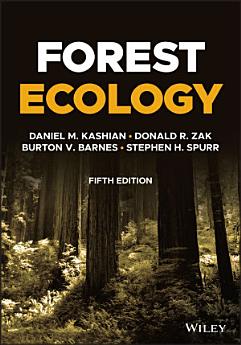Forest Ecology: Edition 5
Acerca de este libro electrónico
Authoritative resource covering traditional plant ecology topics and contemporary components such as climate change, invasive species, ecosystem services, and more
Forest Ecology provides comprehensive coverage of the field, focusing on traditional plant ecology topics of tree structure and growth, regeneration, effects of light and temperature on tree physiology, forest communities, succession, and diversity. The work also reviews abiotic factors of light, temperature, physiography (landforms and topography), soil, and disturbance (especially fire), and provides coverage of ecosystem-level topics including carbon storage and balance, nutrient cycling, and forest ecosystem productivity.
The 5th edition of Forest Ecology retains the readability and accessibility of the previous editions and includes important additional topical material that has surfaced in the field. All topics are approached with a landscape ecosystem or geo-ecological view, which places biota (organisms and communities) in context as integral parts of whole ecosystems that also include air (atmosphere and climate), topography, soil, and water. As such, the book fills a niche utilized by no other forest ecology text on the market, helping students and researchers consider whole ecosystems at multiple scales.
Sample topics covered in Forest Ecology include:
- Contemporary components of forest ecology, including climate change, invasive species, diversity, ecological forestry, landscape ecology, and ecosystem services.
- Characteristics of physiography important for forest ecosystems, including its effects on microclimate, disturbance, soil, and vegetation.
- Genetic diversity of woody plants and genecological differentiation of tree species, including the importance of hybridization, polyploidy, and epigenetics.
- Site quality estimation using tree height and ground flora, and multiple-factor approaches to forest site and ecosystem classification and mapping.
Forest Ecology is a highly accessible text for students, but it also serves as an excellent reference for academics. In addition, practitioners of forest ecology can also harness the information within to gain better insight into the field for practical application of concepts.
Acerca del autor
Daniel M. Kashian, Professor of Biological Sciences, Department of Biological Sciences, Wayne State University, Detroit, USA.
Donald R. Zak, Alexander H. Smith Distinguished University Professor of Ecology; Arthur F. Thurnau Professor, School for Environment and Sustainability, University of Michigan, Ann Arbor, USA.
Burton V. Barnes (deceased) was an integral part of the authorship of Forest Ecology from its 2nd edition.
Stephen H. Spurr (deceased) authored the original Forest Ecology book and subsequent revisions.




